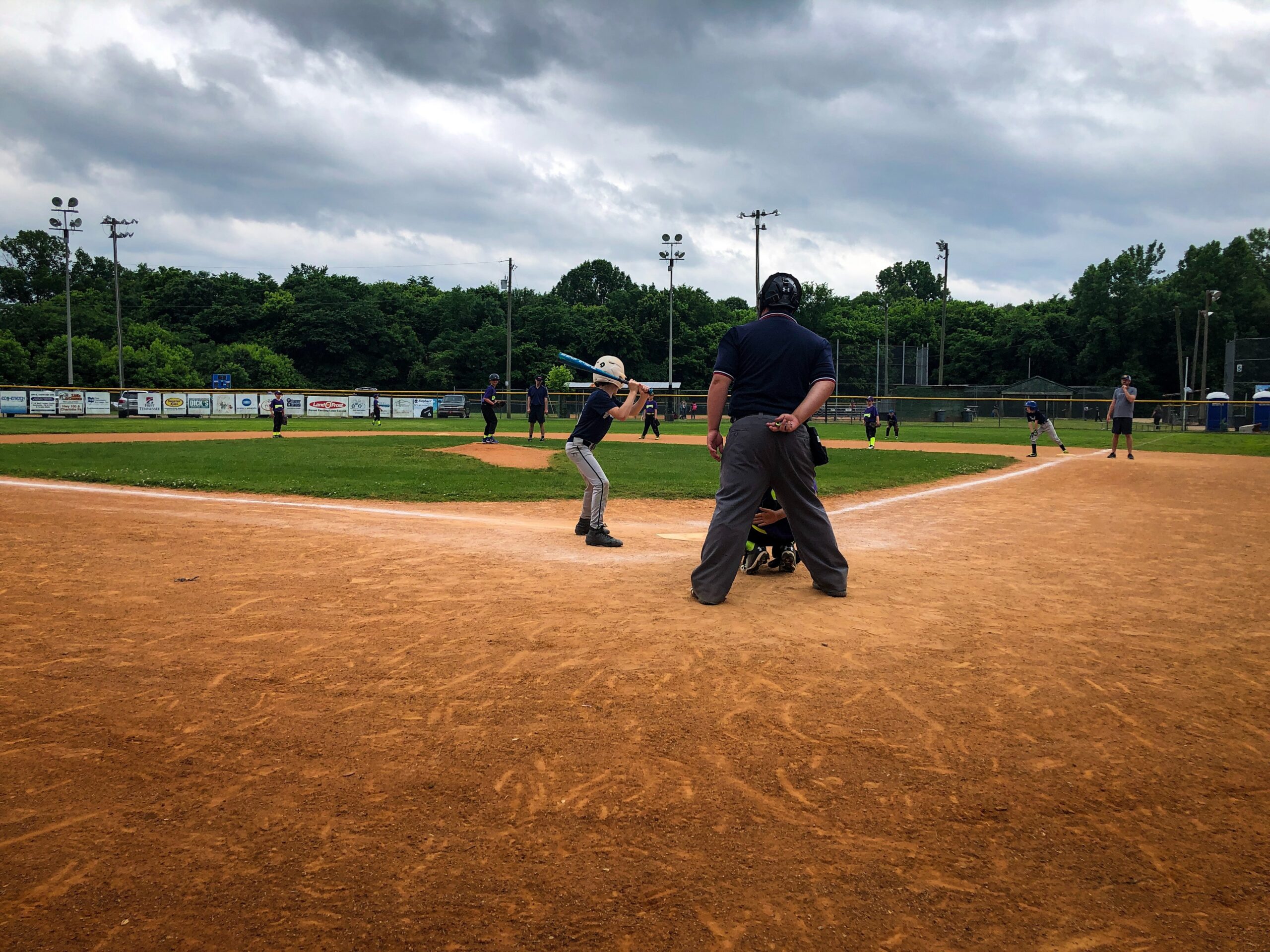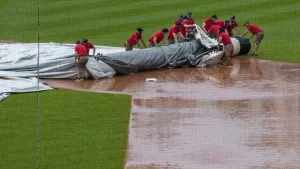Major League Baseball (MLB) has unique rules in place to address game stoppages caused by inclement weather, particularly rainouts. Understanding these rules is essential for both players and fans, as they can directly impact the outcome of a game or even the entire season. We dive into MLB Rainout Rules.
Over the years, MLB rainout rules have evolved to provide a better solution for managing rain-delayed games. The current rules dictate that if a game is cut short due to weather before it becomes official, it will be continued at a later date from the point of the stoppage. This approach ensures that all the innings are played and statistical data remains accurate, promoting fairness in the game.
In the postseason, MLB rules mandate that all playoff and World Series games must be played to completion. In cases where rain makes a game unplayable after the sixth inning, it will resume from that point on a scheduled future date. This rule preserves the integrity of the game and provides teams with equal opportunities to perform their best during essential matches.
Contents
Official MLB Rainout Rules
The Major League Baseball (MLB) has specific rules in place to address games that are affected by weather conditions, such as rainouts. A rainout occurs when a game is either cancelled, postponed, or suspended due to unfavorable weather conditions, including rain, snow, fog, flooding, high winds, lightning storms, or other hazardous conditions for players and spectators.
In the past, rain-suspended games would often be “rained out” entirely, with all stats and performances cleared as if the game never happened. The game would then be rescheduled at a later date, usually creating a new double-header rather than sacrificing an off day. However, starting in 2020, the MLB implemented new rain delay rules to limit the amount of time players and personnel are on the field during non-official games.
With these new rules, if weather causes a non-official game to be cut short, it will not be considered “rained out.” Instead, the game will be continued at a later date from the point of the stoppage. This rule only applies to non-official games, meaning those that have not yet reached the official game status. Once a game reaches the official game status, MLB’s original rain delay rules remain in effect.
For official games, the following rules apply when the game is called off due to weather conditions:
- If the home team is winning, the game is considered complete and over.
- If the home team is losing or the game is tied, it will be considered a suspended game and will resume from the point of stoppage at a later date.
- Visiting teams must have had the opportunity to bat in at least five innings.
These rules are in place to ensure fair play and keep players, spectators, and team personnel safe while dealing with unpredictable weather conditions during MLB games.
Understanding Rain Delay Procedures
Rain delays in baseball occur when the game is stopped due to inclement weather. In such cases, both teams are sent to their dugouts, and a tarp is placed over the infield area to protect it from the rain. Major League Baseball does not have a set wait time for rain delays. Instead, the game resumes when the umpire crew chief determines that it is safe to continue.
The handling of rain delays can vary depending on whether the game is considered “official” or “non-official.” In MLB, a game becomes official after 4.5 innings if the home team is leading or 5 innings if the visiting team is leading. For non-official games, if weather causes the game to be cut short, it will be continued at a later date from the point of the stoppage.
Differentiating between a rain delay and a rainout is crucial. A rain delay occurs when the game pauses due to the weather, but play resumes once conditions improve. In contrast, a rainout happens when the game has been canceled and will either conclude or continue at a later time. When an umpire calls a rainout, it signifies that the weather is not expected to improve soon enough for the game to resume on the same day.
During a rain delay, the stadium staff typically lays out a tarp on the infield to protect the dirt from turning into mud. This practice is essential for preserving the playing surface and ensuring safety once the game resumes.
Determining Game Outcomes in Rainouts
Games Completed Early
In Major League Baseball (MLB), a game is considered official if at least 4.5 innings are completed (if the home team is ahead) or 5 innings (if the visiting team is ahead) when rain occurs. If a game meets these criteria and is interrupted by rain, the team leading at that point is declared the winner.
Suspended Games
If a game does not meet the criteria for games completed early and is interrupted by rain, it becomes a “suspended game.” Suspended games are typically continued from the point of stoppage at a later date. According to MLB’s new rain delay rules, these rules were adjusted for the shortened 2020 season. During that time, non-official games interrupted by rain were continued from the point of stoppage at a later date.
Postponed Games
When a game is postponed due to rain or other weather-related issues, a decision must be made by the home team and umpires regarding when the game will be rescheduled. A postponed game is typically rescheduled for a specific date, either as a standalone game or as part of a doubleheader (two games in one day). Sometimes, the game might be shortened to the number of innings played before the delay.
Rescheduling Rainout Games
Major League Baseball (MLB) has implemented changes to rain delay rules to ensure the safety of players and fans while maintaining the integrity of the game. In the event of a rainout, the rescheduling process follows specific guidelines.
Starting in 2020, when weather causes a game to be cut short before it is official, it will be continued at a later date from the point of the stoppage. In the past, rain-suspended games were “rained out” entirely, and all stats and performances were cleared as if the game never happened. The rescheduled game would usually create a new double-header rather than sacrificing a precious off day.
For rainout tickets, if less than five innings are played in a game (except if the home team is leading at the end of 4½ innings), one of the following policies will apply:
- Tickets for the rained-out game will be valid for the rescheduled game.
- If the game is not rescheduled, purchasing platforms like SeatGeek will follow Club and MLB policies, abiding by the applicable state laws. Ticket holders would then receive an email with details about their options under SeatGeek’s Buyer Guarantee.
During a rain delay, umpires are expected to wait for at least 75 minutes for the conditions to improve before making a decision on the game’s status. This protocol ensures that fans, stadiums, and teams are properly informed and prepared for any adjustments in the schedule.
Implications for Ticket Holders
When a Major League Baseball (MLB) game is affected by rain, ticket holders may be concerned about the fate of their tickets. Generally, if a game is postponed or not played because of inclement weather, tickets will be valid for the rescheduled date or may be exchanged for a ticket for another game later that season, depending on the team’s policy.
In the case of a game being called due to rain, a “rain check” is usually issued to the spectators. This rain check, often represented by the ticket stub, can be exchanged for a ticket for the make-up date or for another game later in the season.
Different teams may have specific policies related to rainouts. For example, the Detroit Tigers follow a “Rain Check” policy. According to their policy, in the event that five innings of a game aren’t played, except if the Tigers are in the lead at the end of 4½ innings, one of their specified policies will apply.
In summary, ticket holders need not worry about the implications of a rainout on their tickets. Instead, they can focus on the enjoyment of attending an MLB game, whether on the originally scheduled date or a rescheduled one.
Historical Rainout Moments in MLB
Throughout the history of Major League Baseball (MLB), there have been numerous rainout moments that have made an impact on the sport. These moments, both significant and lesser-known, have shaped the MLB’s rules and the way the game is played today during inclement weather.
One notable moment occurred during the 2008 World Series between the Philadelphia Phillies and the Tampa Bay Rays. In Game 5, heavy rain caused an official suspension of play, which left the series temporarily undecided. After a 46-hour delay, the game resumed and the Phillies emerged victorious, taking home the championship title.
Notable rainout delays:
- June 12, 1979: Comiskey Park shootout – Nearly two inches of rain fell in the Chicago area, causing the White Sox to cancel their game against the Detroit Tigers. As a result, the infamous “Disco Demolition Night” promotion took place during a double-header the following day, in which an anti-disco protest led to the destruction of a large number of records.
- April 7, 1988: Longest-ever opening day delay – Rain in Oakland led to a lengthy delay, marking the longest opening day delay in MLB history at the time. The Oakland Athletics and Seattle Mariners waited seven hours and 23 minutes before starting the game, with the A’s ultimately winning 4-3.
In addition to these remarkable rainout moments in MLB history, the league’s ongoing efforts to improve its rain delay rules and safety protocols have played a significant role in adapting the game to unpredictable weather conditions. By studying past events and making necessary adjustments, MLB continues to work towards delivering the best possible baseball experience for both players and fans, rain or shine.


